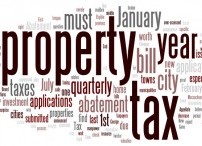Are You Eligible for a Property Tax Abatement?
[This is a guest post written by attorney George Warshaw.]
Have Your Property Taxes Gone Up?
There is no more unpleasant New Year’s surprise than to find a tax bill in your mailbox for your home or condo, especially if your taxes have gone up.
Massachusetts has a confusing way of taxing properties.
First of all, the tax year starts in July, not January (i.e. which the government calls a “fiscal year”). Fiscal year 2013 began last July 1, 2012.
Secondly, most cities and towns issue bills quarterly (Boston, Brookline) while some bill semi-annually (Cambridge, Cape Cod).
Changes in taxes, rates and valuations are announced in the middle of the tax year (January for quarterly taxpayers), not in the beginning (July). One must wait until January to find out what the taxes should have been last July.
If that isn’t confusing enough, here’s the tongue twister: any increase or decrease in the value of your property that appears in a January tax bill doesn’t relate to the year in which the bill is issued; it relates to the previous tax year!!!
The value the city puts on your property that appears in the tax bill issued in January 2013 is what the city believes your property was worth on January 1st 2012 – one year ago!
Now try to figure that out!
Are You Eligible for a Property Tax Abatement?
If your home or investment property is being over-assessed by the city you may be eligible for a tax abatement.
Every January, municipalities that have a quarterly payment plan (like Boston) announce new tax rates and new assessed values of homes and investment properties.
The question that you must answer in your application is what your property was worth on January 1, 2012 (one year ago). Your real estate broker is often a great resource of information.
Abatement applications in cities and towns that bill quarterly must usually be submitted by February 1st (be sure to check your town). In order to be eligible for an abatement – and this is critical – all property taxes due by February 1st (including any past due) must be paid by that date.
Once an abatement application is submitted, the city or town must accept your valuation, make a compromise or reject it within a specific period of time. Many applications, especially in Boston, are rejected merely because the city runs out of manpower to process all the applications. If an application is rejected, all is not lost. A property owner still has a right to appeal to the Appellate Tax Board and begin a legal proceeding.
—
[George Warshaw is a well-known attorney and author. He represents buyers and sellers of homes and condos in Massachusetts, and prepares wills, trusts, and estate plans. George welcomes new clients and questions. Contact him at george.warshaw@warshawlaw.com.]


